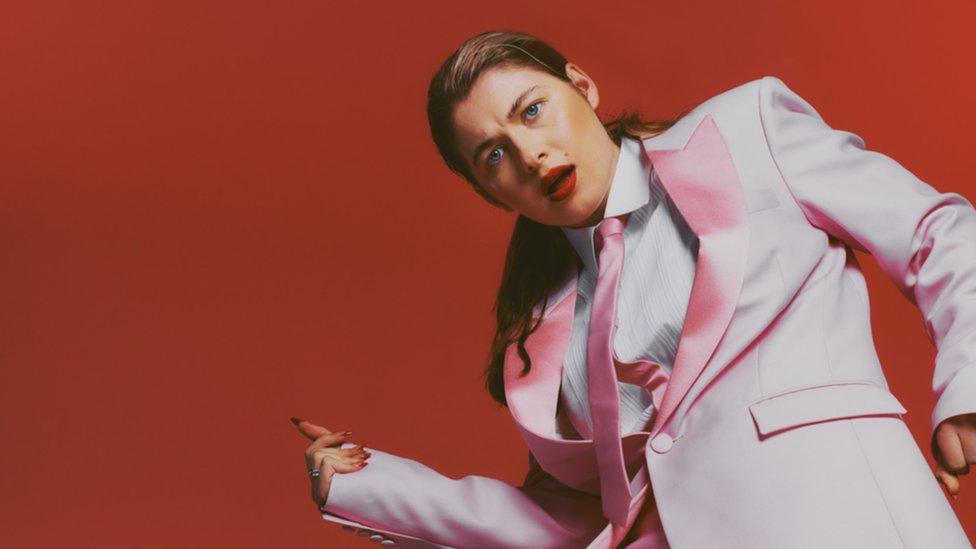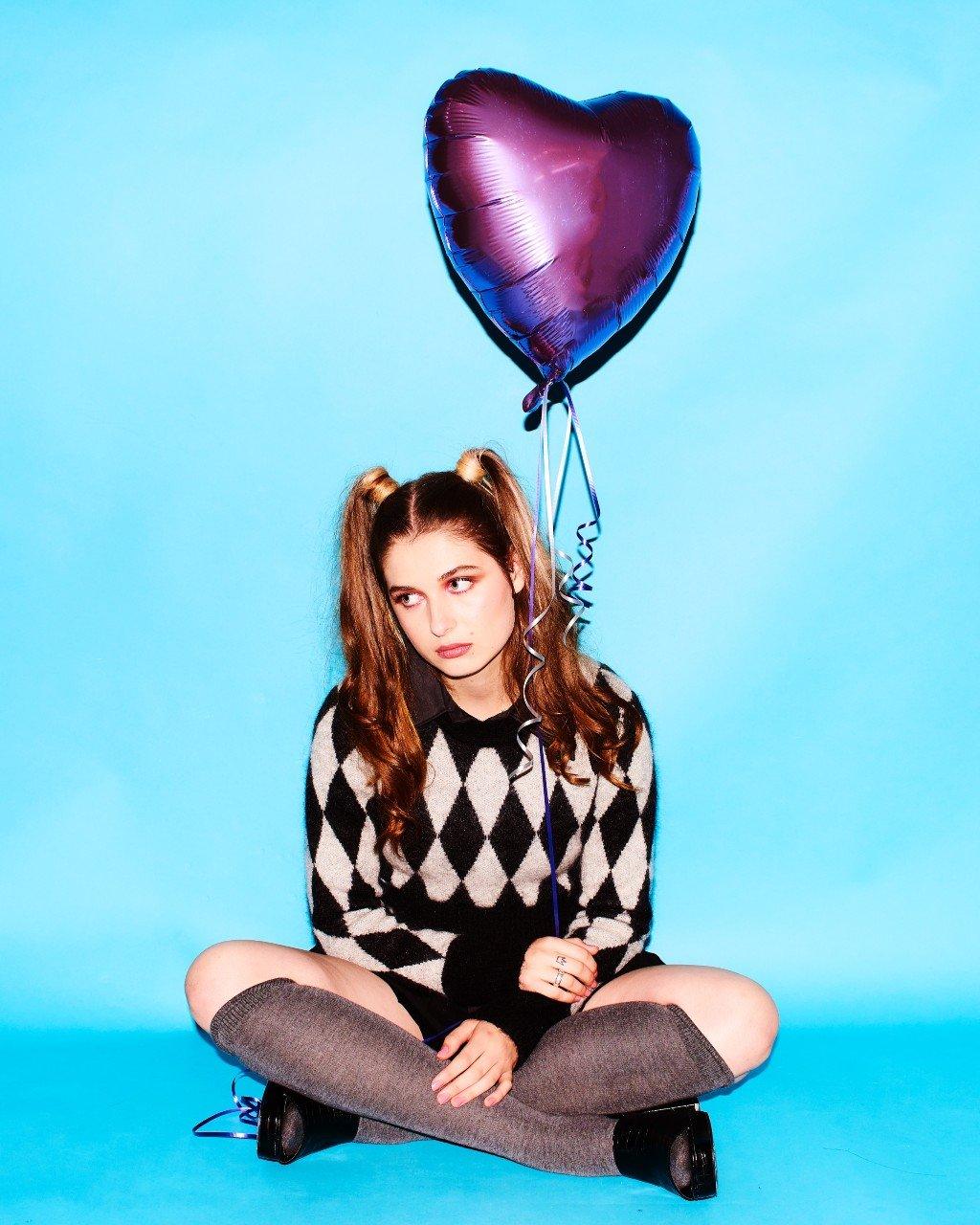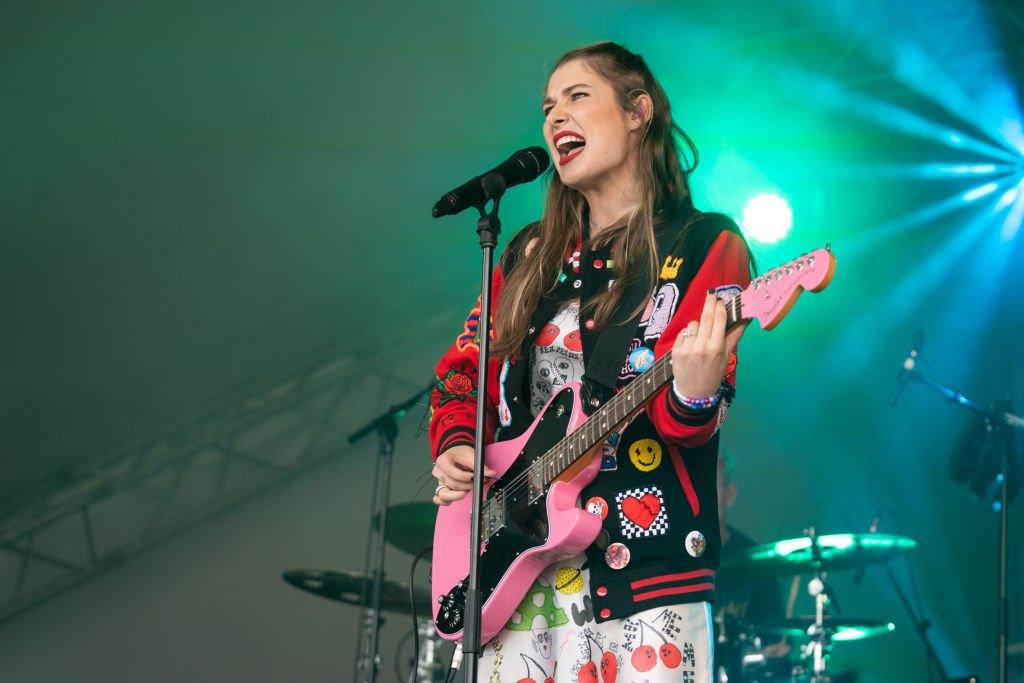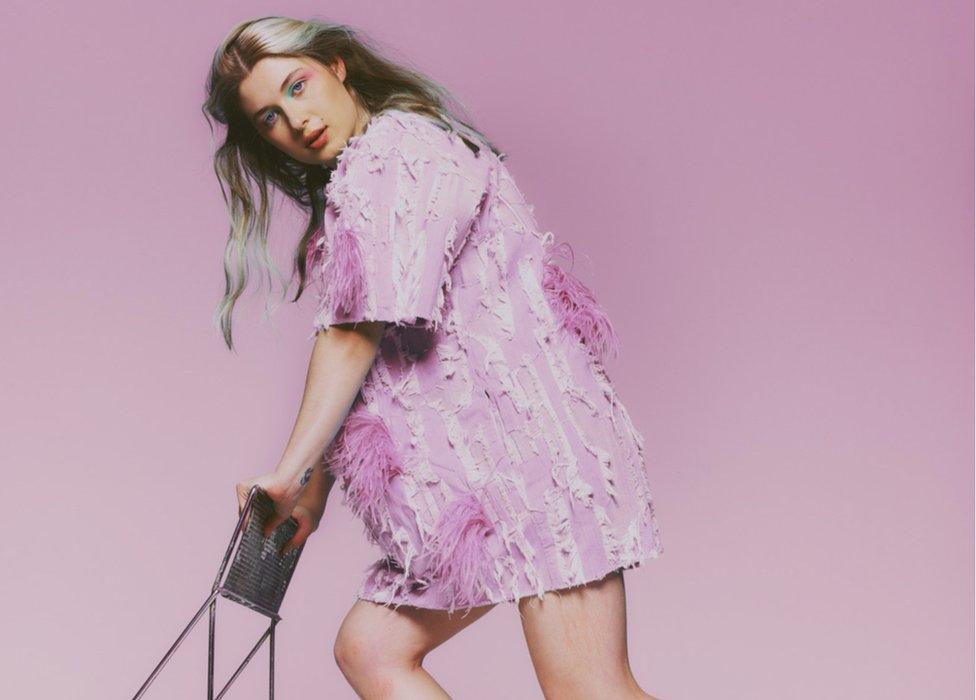Baby Queen: Meet pop's boldest, sharpest new voice
- Published

Baby Queen: "I have a problem releasing music that doesn't feel significant"
Eighteen months ago, Arabella Latham was working behind the counter in East London's Rough Trade Records, packing vinyl into mail-order boxes, sorting the shelves and dreaming of the day her own music would be featured in the shop's window display.
Sometimes, in the middle of a shift, she'd dream up a lyric and scribble it on a post-it note. Eventually, her colleagues started collecting them and sticking them up in the staff room.
"They called it Bella's Wall," she recalls. "God knows what they thought of me. There was some pretty wild stuff on there."
When the pandemic hit last year, the shop closed its doors and Latham lost her job - but Bella's Wall had already offered a way out.
Within weeks of the first lockdown, Latham - or rather her sardonic alter-ego Baby Queen - signed a deal with Polydor Records. Last Friday, customers at Rough Trade could pick up her first mixtape, The Yearbook, from the shelves she used to stack.
When we meet at the store a week before the CD's release, Latham is casually cadging a free coffee from one of her former colleagues. She promptly spills it all over her pristine white dress.
"Great start," she laughs.

The star was born and raised in Durban, South Africa
Actually, this is the perfect introduction to Baby Queen, whose scorchingly relatable lyrics hold up a mirror to the messed-up, chaotic, post-Millennial world she was born into.
Last year's debut single, Internet Religion, skewered the shallowness of social media influencers, as she intoned: "I'm done saving the world, so take a look at these cool shoes."
She followed that up with Medicine, a fiercely honest account of her life on anti-depressants. "My heart can't break," she observed, "because my medication confiscated sex".
And she kept releasing more - a new song every six weeks, tackling everything from body dysmorphia and self-hatred to her ambivalent relationship with drugs.
The songs almost immediately found an audience of young people who, like Latham, felt alienated and disaffected, but couldn't resist a honking great pop chorus.
Allow YouTube content?
This article contains content provided by Google YouTube. We ask for your permission before anything is loaded, as they may be using cookies and other technologies. You may want to read Google’s cookie policy, external and privacy policy, external before accepting. To view this content choose ‘accept and continue’.
"I have a problem releasing music that doesn't feel significant," says the 24-year-old. "And I have a massive issue with releasing love songs. A massive issue with it."
She explains: "You have kids listening to music, and every day they have to deal with all these things - insecurities and depression - to stay afloat. So to make a career out of writing songs about fancying someone feels like dishonesty, to me.
Latham writes a lot about self-esteem, both her own and how social media affects that of others.
"I hate myself. I'm the most insecure person," she says. "And the weird thing is that I thought it was just me. But it's not just me, it's everyone.
"I think that's why my music connected in a way that I didn't expect it to, because every single kid listening to it was like, 'Oh my god, I also hate myself.'
"I get a real kick out of that. I want my work to feel significant, otherwise you're wasting your breath."
Big dreams
Latham arrived in London from South Africa six years ago, with a dream of making it in the music industry. She was, she admits, totally unprepared for how hard it would be.
"I came over here with a stack of 500 demo CDs, and I would just go knock on record labels doors, like, 'Hi, I'm from South Africa, I've got this little demo CD, would you like to listen to it?'" she recalls, wincing at the memory .
"They'd just go, 'Sorry, we don't take unsolicited material.'"
Undeterred, she took a job waitressing at the Brit Awards, only to have her dreams crushed again.
"It was horrific, they treated me like trash! All I wanted to do was be like, 'Hey Rihanna, would you listen to my CD?' But, obviously, they wouldn't let me speak to any of the artists."

The singer built a career from her bedroom but "as soon as I played a live show, it was like this pressure was released"
London was an all-out assault on the senses compared with the leafy suburbs of Durban; but Latham found herself drawn to the pace and chaos of the city.
Soon, she'd moved out of her aunt's house in Fulham and into a houseboat with her fashion model girlfriend. She dyed her hair black, got her first tattoo and began sampling all the late-night temptations the capital had to offer.
It was after one of those excursions - a "great but essentially horrific night out in East London" - that she sat down and wrote the first ever Baby Queen song.
Pain barrier
"I was on the biggest comedown of all time," Latham recalls. "That song is almost like word vomit. It's really brash, honest thoughts being said really plainly. There's nothing metaphorical about it."
Called Raw Thoughts, it maps out the way euphoria crumbles into shame and regret the morning after a heavy night.
"God forbid they see what I did," Latham squirms, just before the drums kick in and whisk her back to the small hours of the morning.
"It was one of the quickest songs I've ever written," she says. "Usually, there's a pain barrier of like, 'Argh, this isn't working. What the hell am I even saying? This is a terrible song. I'm a terrible songwriter.'
"And then one day, a lightning bolt hits you, and it's like a gift. This was one of those. It took 20 minutes"
Allow YouTube content?
This article contains content provided by Google YouTube. We ask for your permission before anything is loaded, as they may be using cookies and other technologies. You may want to read Google’s cookie policy, external and privacy policy, external before accepting. To view this content choose ‘accept and continue’.
While she considered the music "a bit mimicky" or generic, something about the lyrical stream-of-consciousness told her she'd reached an important milestone in her writing.
"That's what I found really interesting," she says. "I've got a very specific personality - very negative, very satirical - and when a few more songs started to add to that character, I knew I was on to something."
The first song that truly nailed the Baby Queen persona was Buzzkill, a party burn-out anthem in which Latham's friends make a futile attempt to stop her being on a permanent downer,
"If I was to describe Baby Queen to you in one song, I'd play Buzzkill because it has that really, really, really jaded voice," she says. "And the more I pushed the honesty, the more I had lines that I thought were going to make people go, 'Did she just say that?' That's what really excited me."
Allow YouTube content?
This article contains content provided by Google YouTube. We ask for your permission before anything is loaded, as they may be using cookies and other technologies. You may want to read Google’s cookie policy, external and privacy policy, external before accepting. To view this content choose ‘accept and continue’.
Latham's self-immolating lyrics earned her some A-list fans, most notably Courtney Love, who took the young singer under her wing, inviting her to her house "to practise Buddhist chants and watch Almost Famous in her downstairs cinema".
She also struck up a friendship with Jodie Comer, after writing an only-partially-tongue-in-cheek song about her unrequited love for the star.
"My family kept on saying to me, 'You've got to watch Killing Eve because this girl reminds us of you,'" she recalls.
"I was like, 'OK, tell me about her. What does her character do?'
"They said, 'Oh, she's a murderous psychopath.'
"And three episodes in, I was head over heels. I wrote that song about her, got the Instagram follow, and she slid into my DMs!"
She won't divulge the contents of those messages - but she's hoping Comer will cameo in one of her upcoming music videos.
"Then we'll have a tequila shot together and we're going to get married."

Latham says she's hoping to complete her debut album by the end of the year
While the first tranche of Baby Queen songs all possessed a dark, brittle core, her new mixtape, The Yearbook, has a more colourful emotional spectrum.
Latham hasn't lost her cynical snark ("Jesus died for me to say / 'You're not human; you're gay,'" she spits in the alt-right takedown Fake Believe) but she also allows more intimate moments - notably on the wound-licking break-up anthem You Shaped Hole.
These Drugs, meanwhile, is an unflinching look at substance abuse, with a killer opening line: "I don't want to do drugs anymore / If you saw me through the eyes of the bathroom stall / Your skin would crawl."
Latham stresses she's never had a full-blown addiction but, when she wrote those lyrics, she was in a "really bad relationship with substances".
"I've always wanted to find an off button in my brain," she says. "You get to a certain point of being spaced out, where your brain switches off, and you get to exist outside of the constant barrage of negativity inside your head.
"So I would use drugs, essentially, to feel something different - and then the next day, all my serotonin would be depleted and I'd feel guilty about my lack of productivity."
She traces the guilt back to her upbringing.
"It's small-town syndrome. If you do drugs in South Africa you are like a dropout, crazy bitch. And I still feel guilty because my morals are like through the eyes of, like, my mom.
"Like, even at Boardmasters [festival] the other weekend, I got wasted after my set and I was standing in the crowd watching Gorillaz, and I just felt this guilt: 'You're doing the wrong thing, you're doing the wrong thing, you're doing the wrong thing.'"
Allow YouTube content?
This article contains content provided by Google YouTube. We ask for your permission before anything is loaded, as they may be using cookies and other technologies. You may want to read Google’s cookie policy, external and privacy policy, external before accepting. To view this content choose ‘accept and continue’.
Despite that, Latham says she's a completely different person to the one who wrote These Drugs. Focusing on her career has given her a renewed drive and a happier outlook on life.
She's currently working on her debut album, which has to be handed in to her label "by the end of the year" - but she won't take any shortcuts or call in a batalion of big-name pop producers.
"I don't do writing sessions, because you're expected to go into the studio and finish a song in eight hours," she explains. "I don't think that you can finish anything meaningful in eight hours.
"Sometimes, I'll only write two words a day to fill in the gaps in my verses - because I've got this perfectionist thing where if a line is just filling space without meaning anything, I hate it."
But one thing has changed since her first single dropped last May: She's been forced to revise her ban on love songs.
"I can't help it if I fancy someone," she laughs. "I've got so many love songs on the next album that I'm writing and it's a nightmare!"

Follow us on Facebook, external, or on Twitter @BBCNewsEnts, external. If you have a story suggestion email entertainment.news@bbc.co.uk, external.